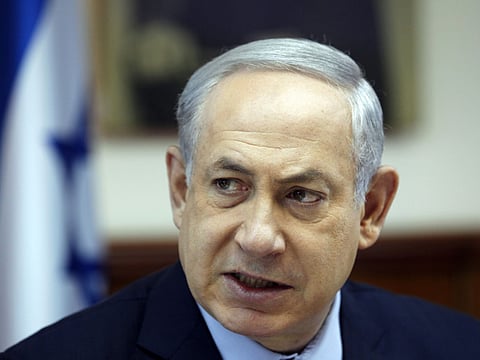Netanyahu’s fragile vision
Few in Israel today understand the dangers of refusing to recognise the Palestinian right of self-determination and ending occupation

During his visit to the United States last week and his meeting with US President Barack Obama at the White House, Israeli Prime Minister Benjamin Netanyahu said he still believed in the two-state solution, but it was obvious that he was only paying lip service. Neither he nor Obama suggested concrete steps to revive peace talks that would make the solution a reality. In fact, Netanyahu put the blame on the Palestinians, saying that they had refused to recognise Israel as a Jewish state, adding that the problem was not “the [colonies] but the persistent refusal to accept a Jewish state”. He was also quoted as saying that there would not be peace or withdrawal for at least 20 years.
Obama does not believe that the two-state solution will be realised before the end of his presidency next year. He blames the Palestinians for the latest cycle of violence. His administration has done nothing to force Israel to freeze colony activities. And while Netanyahu was in the US, it was revealed that his government gave preliminary approval to development plans that could build more than 2,000 homes in West Bank colonies over the next 15 years.
Since the Oslo agreement in 1993, the number of Jewish colonists in the West Bank has more than doubled to an estimated 547,000 today. This includes more than 250,000 colonists in occupied East Jerusalem. Heading the most right-wing government in Israel’s history, Netanyahu has become hostage to the growing power of the colonists.
The reality today is that the two-state solution is over unless the Israeli society and the new generation of leadership recognise that maintaining occupation and expanding colonies threaten the very existence of their state. Few in Israel today understand the dangers to their future as a result of refusing to recognise the Palestinian right of self-determination and ending occupation.
Since the eruption of the Arab Spring in 2011 and the regional chaos that followed, Israel’s leadership became less interested in reviving peace talks with the Palestinians. The US and indeed the rest of the world were busy with more pressing crises. Even Arab attention to the Palestinian cause faltered as the region was engulfed by conflicts and challenges in Libya, Egypt, Syria, Iraq and Yemen. The emergence of the threat of Daesh (the self-proclaimed Islamic State of Iraq and the Levant) became the focus of regional and international coalitions. The Palestinian leadership found itself alone in trying to present its case to the world.
As the Israeli society moved further to the right, Netanyahu was able to press ahead with his extremist policies in the Occupied Territories virtually unchallenged. His government expanded colony activities, completed the separation wall that has partitioned the West Bank and isolated occupied East Jerusalem and violated every agreement with the Palestinian National Authority (PNA) under Oslo. By discrediting Palestinian President Mahmoud Abbas, Israel has weakened the only man with whom it could reach a deal.
Netanyahu never believed in the two-state solution. His vision sees the Palestinians acquiescing to endless occupation and submitting to a reality dictated by Israel. In the end Israel would allow the Palestinians to run their daily affairs in cities, villages and camps that are surrounded by Jewish colonies. The Palestinians would provide cheap labour to the neighbouring colonies and enjoy the rewards of an economic peace.
This vision is easily challenged, even by some enlightened Israelis. It threatens to corrupt the foundations of the Israeli state which sees itself as democratic, open and westernised. It fails to deal with the demographic challenge that the Palestinians pose. It assumes that the Palestinians will accept to live under occupation without fulfilling their national aspirations. It also assumes that the world will accept such hegemony that is unmatched anywhere else.
But the events of the past few weeks have proven how fragile Netanyahu’s vision is. Following repeated provocations by Jewish extremists in Al Aqsa and the Israeli government’s apparent attempt to change the status quo in Al Haram Al Sharif, the Palestinians rebelled and vented their anger on colonists and occupation forces. The uprising is leaderless and is fuelled by the rising despair among young Palestinians. Since its outbreak, up to 90 Palestinians, mostly young men and women, have been killed by Israel. The brutal reaction by the government reflects the state of denial and bigotry by Netanyahu and his partners.
But it also underlines the readiness of Israel’s leaders to corrupt the spirit of their own state. Laws are being passed that target young Palestinians, from imposing long prison sentences against stone-throwers to changing the legal status of 12-year-olds from juveniles to adults in order to send them to jail.
The Palestinians have no option but to rebel against their occupiers and to make the occupation as costly as possible for Israel. The two-state solution may be dead and buried, but the alternatives for Israel will be destructive and suicidal. Netanyahu’s vision is no more than wishful thinking and his policies will ensure the end of Israel’s dominance over the Palestinians.
Osama Al Sharif is a journalist and political commentator based in Amman.


